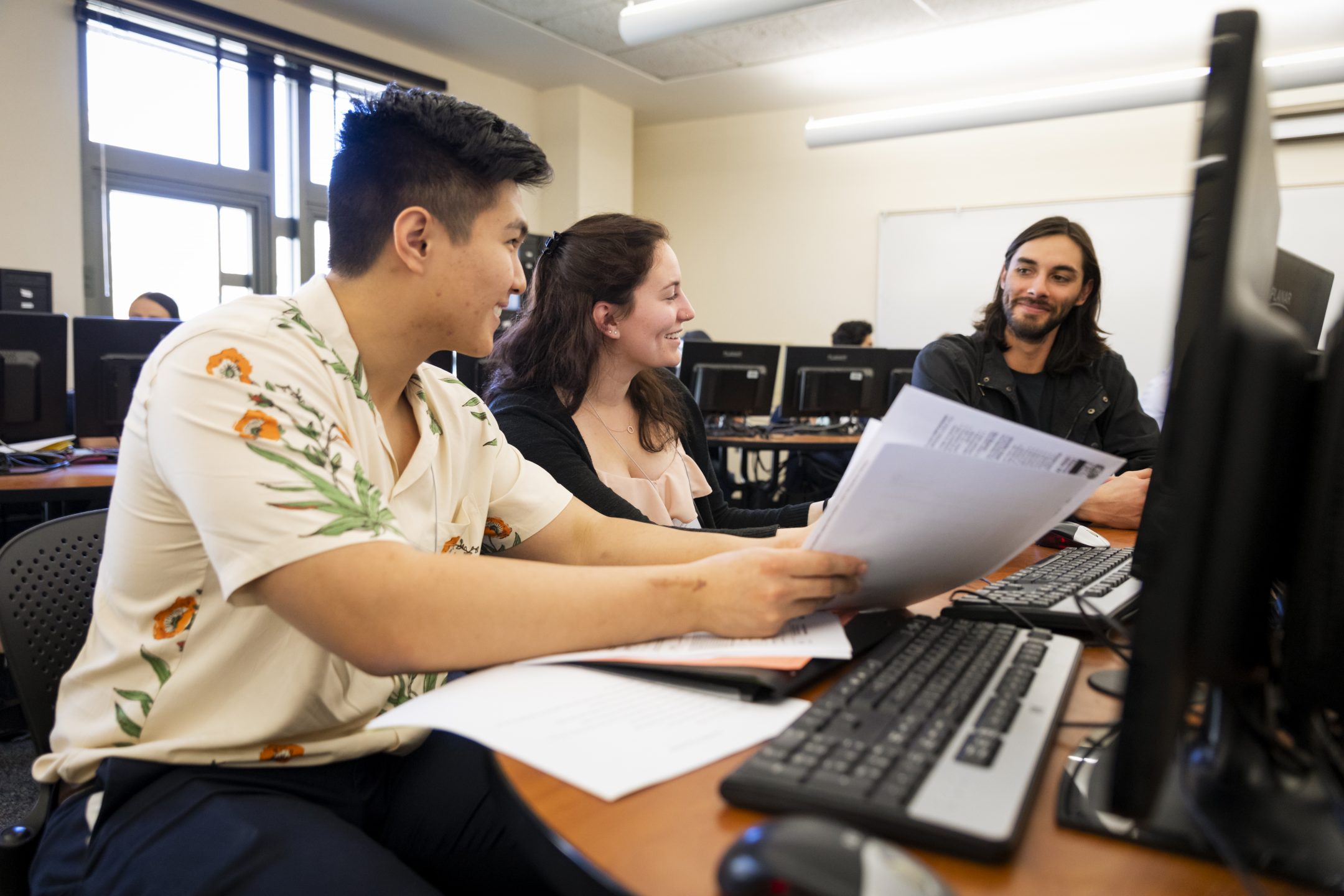BUS 416: A VITA-l Community Resource
For nearly 30 years, students in a distinctive Cal Poly business course have been helping community members prepare for the most taxing time of year.

By Alex Wilson | Photos by Joe Johnston
It’s a bright and warm Saturday morning and, contrary to normal weekend status, the parking lot at the Orfalea College of Business is overflowing. Clusters of people with folio binders and governmental papers bustle back and forth across the grass and up the staircase, following sandwich-board signs that read Cal Poly Tax Prep.
The computer lab on the third floor is a similar hive of activity. It’s just before noon and according to Professor Trisha Daughtrey — a certified CPA who runs the Volunteer Income Tax Assistance (VITA) program as the core of her Business 416 course — she and her team of 92 students have already prepared, processed, and submitted income tax forms for about 60 clients.
Now the printers are down and she’s huddled with her IT team to trouble shoot. “Things are a little hectic today,” she says, despite all indication that the student tax preparers at their terminals are still churning through clients efficiently and, judging by the atmosphere in the lab, helpfully, calmly, and happily.
The VITA clinic is an initiative that dovetails neatly with the core tenants of a Cal Poly education. It’s essentially a fully functioning CPA business run by students, designed to serve the community by providing free tax preparation to anyone with an income below $56,000 per year.
As such, it has all the hallmarks and staffing of a commercial and service enterprise. The student cohort is subdivided into teams, covering everything from reception, to actual document processing, to the aforementioned IT and e-filing crew. There’s also a media and marketing team, which is responsible for fielding news requests and increasing the volume of the business. Part of their mandate is to spread awareness about the clinic via digital channels, traditional media outlets, and old-school print-flyers alike, in addition to breaking out across the county to canvass farmers markets and other community gathering places.
I’ve been coming here for the last 15 years and I haven’t had a single issue with my documents. I trust them 100 percent.
“They basically do everything from the first moment they’re enrolled,” says Daughtrey. “They come to class and five weeks later they’re given a business to run and they go and do it.”
The pedigree of success Cal Poly students have established over the years while working for VITA is substantive. The program has been preparing tax returns since 1992 and is sponsored by the California Franchise Tax Board, the Internal Revenue Service, and the Cal Poly Accounting Area. According to Daughtrey, Cal Poly VITA has processed roughly 33,000 federal and state income tax returns since its launch.
“They provide an amazing service to the community,” remarked a client in the waiting area who wished to remain unidentified. “In the past, I used to go to other big-name tax preparation services and they’d make mistakes and I got into trouble with the IRS. But I’ve been coming here for the last 15 years and I haven’t had a single issue with my documents. I trust them 100 percent.”
Since the clinic also fulfills senior project requirements, it’s intentionally structured to provide students with applicable, real-world skillsets, plus the room to reflect on their growth during the education process. In addition to running the business operations and preparing all the returns (which are then reviewed by Cal Poly faculty and local certified tax professionals), the VITA teams go through extensive training and are asked to pass the IRS and Franchise Tax Board volunteer exams.
They’re also tasked with keeping a journal during the quarter to document their experiences, an aspect of the course that — on the surface — would seem to run counter to a stereotypical accounting curriculum, focused purely on numbers. “That’s actually my favorite part of the class,” says business administration senior Samantha Gonzalez. “In reading over your entries, it’s cool to see how you progress from nervousness about interacting with the clients to feeling more comfortable as you gain experience.”
“It’s a great program to prepare us for working in our profession,” adds accounting concentration senior Misael Caballero. “I come from a low income family, so I can relate to a lot of the things our clients are talking about. Sometimes they’ll tell me their stories and my parents have a similar background and it almost seems like I’m helping my own family. I’ve always wanted to give back to the community. That’s one of the main reasons I came to school in the first place and that’s exactly what we’re doing.”


